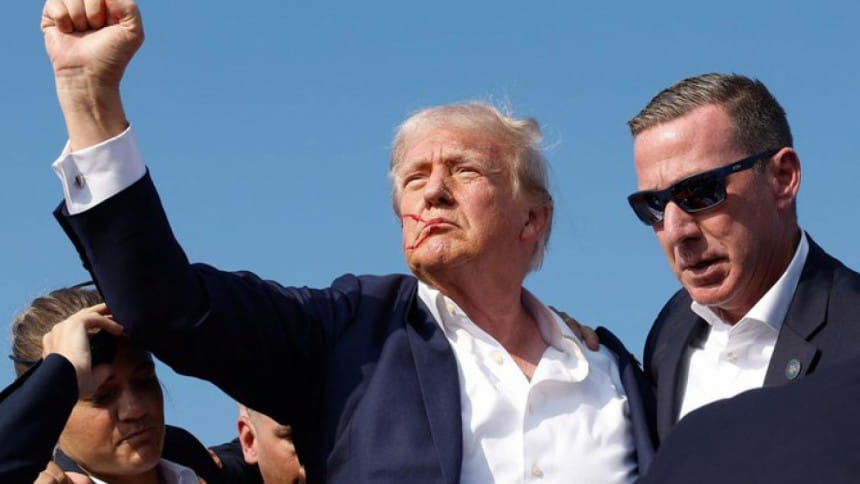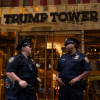How Trump's assassination attempt affects the US election

Throughout history any attempted assassination has been memorialised, canonised and imprinted onto the public psyche. In many cases the act of assassination has been a turning point—from Benazir Bhutto, to Indira Gandhi to John F Kennedy and Abraham Lincoln, all these world leaders have had an abrupt end to their flaring political careers, but are remembered more for their good than bad, regardless of which side of the political line the public of the day inclines. While many have come up with conspiracy theories after the assassination attempt on former President Donald Trump in a rally in Pennsylvania on Saturday, Trump has received words of assurance, condolence and kindness across the board. The imagery of blood trickling down his face and fist up in the air is quite iconic and heroic—supporters who loved him love him more, and the ones who did not look at him are looking at him now.
This unprecedented event has not only pivoted attention away from major world issues, at least in the US, but it could also be a major turning point for the outcome of the current election. It has already charged the Republican Party, and it will continue to shape their strategy as they move forward with packaging their rhetoric. However, despite the fact that the attack could have been avoided with some form of gun control, the party's position on gun control and the Second Amendment will remain intact. Two of the most talked about US presidents in history, who were party favourites—Theodore Roosevelt and Ronald Reagan were also survivors of assassination attempts and Trump has now joined that list. Though his felony cases did not really play a pivotal role in the public's decision to support or not support him, this incident takes away any clout from the hush money, falsification of business records, corrupt dealings and hearings might have had. Following the attack, a Florida judge dismissed the federal classified documents case against Donald Trump on the grounds that the Department of Justice unlawfully appointed special counsel Jack Smith.
Since the last week of June, Trump has held a lead in the national polls according to FiveThirtyEight; after the assassination, it has gone up by two percent over Biden, while Biden's national disapproval rating is on the rise. The political ground has been made fertile for Project 2025—a $22 million project led by the right-wing think tank, Heritage Foundation, with an autocratic bend that aims to realise staunch Christian nationalist principles, undermine separation of power, eliminate the department of education, curb climate change and civil liberties related regulations, push for significant cut to social security provisions and establish partisan leadership in major agencies. It is a presidential transition operation specifically intended for the republican nominee, Donald Trump, and if it becomes a reality, it would significantly alter US policy and institutions.
The much-talked about debate between the two-party candidates was a smudge, a mishmash of dubious claims—the optics of which takes the public further away from considering the real policy changes and tangible upheavals that they will encounter. The debate did nothing to change minds—undecided voters are still undecided and will likely remain undecided and the ones who have decided not to pick the lesser of the two evils won't hit the polls. The Republican National Convention proved to show a Republican Party recharged with Trump's words minutes after surviving the attempt: "Fight, fight, fight." Security was ramped up for the convention so that the security failures were not repeated, although questions still remain both for the security apparatus and the public on how the shooter got so close and why there was a failure. The Justice Department under Attorney General Merrick Garland can be trusted to carry out a full-fledged impartial investigation, but the question persists if the same can be expected from the Justice Department under another Trump presidency. It is vital to save institutions from the flare of party politics so that they can be dependable service providers for the public. It is the public that should be pushing politics not the other way round, but the opposite is the reality.
The Secret Service which shot the shooter down, has a long discreet relationship with the Trump family with a reputation for spending millions of taxpayer dollars on Trump's hotels, private properties and clubs. What we are witnessing is a monumental loss of institutionalisation for the Republican Party, as its politics revolve around amplifying Trump, a move from defending conservative ideals which are fundamentally against debasing the branches of the government. The creation of the new party platform for the Republicans is a closed process, which is unlike other election cycles. As Biden attempts to try his chances by declaring he knows how to say the truth, in many ways, so does his opponent Trump is clearly adept at speaking his version of the truth.
While many of Biden's liberal and progressive voter bases are lacklustre—with much of the lethargy stemming from the US' role in the ongoing genocide in Gaza—Trump activists are on the move, and this shooting event has only added more fuel to the movement. Trump has established, although mostly rhetorically, that he is the commander-in-chief who gets things done and he is the one who is taken seriously by the world leaders. The assassination attempt could legitimise Trump's rhetoric for swing voters. Regardless of the sound bites we must not forget what was actually accomplished during Trump's last term and the risks associated with the promises of Project 2025. From the cusp of misinformation, we slid into the labyrinth of fake news, alternate and multiple realities, loss of objectivity, immense push backs against reproductive rights, scandalous turnovers in the government.
The extent to which the public has been exposed to chaos has truly made them immune to the likes of such ruptures in US institutions which were meant to be trusted. The ultimate and the biggest numerical outcome of the Trump presidency was the number of Covid deaths and insensitivity at a time when the world needed to come together. Sure, there was some progress in foreign policy, but the magnitude of loss is much greater. And an important question needs to be considered: would the genocide of Palestinians by Israel stop if Trump takes office? That is a complicated question given that Trump courts evangelical Zionists who are quite influential in the broader national political landscape. He also called Biden a "bad Palestinian" denigrating an entire people and glossing over the constant trauma and brutality against humanity.
Technocracy of the Democratic Party may have made it a party of the elites, but the Republican Party is not quite the people's party and it hasn't been in a long time. People may rather prefer doctors to run a hospital versus a family who would run the healthcare establishment like a business. Trump is known to appoint his family members and loyalists in influential government posts, which reeks of corrupt "third world" family-run governments with compromised institutions. But whether American citizens will see that truth, and the problem with that, seems further away today than it was before the assassination attempt.
Joe Biden—whose candidacy was in doubt, with talks of his replacement dominating the headlines before Trump's assassination attempt—is now in a more precarious position. Biden is a leader who has delivered before, both on the goods and bads, but he has reached a ceiling with his support for the genocide—another political move to keep Israel sympathisers in the Democratic party's pocket. Pollsters can make sound predictions about the general election, but the future of both parties, particularly the Republican Party, looks bleak as its institutional rigour erodes and the party turns into a movement around one man and his family cantered top-down leadership. The optics of the shooting event will only expedite that erosion. In this market place of democracy, we have only a few bad choices.
Sarzah Yeasmin is a Boston-based Bangladeshi writer. She works at Harvard Kennedy School and is currently pursuing a micro-master's in data and economics from Massachusetts Institute of Technology (MIT).
Views expressed in this article are the author's own.
We welcome your contributions and analysis of global events, and responses to our articles. To submit articles to Geopolitical Insights, please send an email to [email protected].
Follow The Daily Star Opinion on Facebook for the latest opinions, commentaries and analyses by experts and professionals. To contribute your article or letter to The Daily Star Opinion, see our guidelines for submission.

 For all latest news, follow The Daily Star's Google News channel.
For all latest news, follow The Daily Star's Google News channel. 






Comments